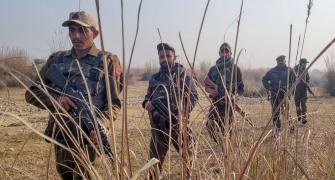Food security, minority welfare and legislation to deal with communal violence ranked high in the 14-point focus area listed by the newly-constituted National Advisory Council (NAC) headed by Congress President Sonia Gandhi at its first meeting in New Delhi on Thursday.
The NAC held a nearly four-hour brainstorming session with Gandhi emphasising that the people have "high expectations" from the advisory body which played a key role in enactment of Right to Information Act and the rural jobs scheme during UPA-I. The 14-member NAC was constituted on June 1 and is expected to advise the government on various social programmes like food security and rural development. All the members of the NAC had a 90-minute meeting with Prime Minister Manmohan Singh who acknowledged the "historic" role played by it earlier. Singh expressed confidence that the NAC members endowed with wisdom, experience in diverse areas will be able to assist the government in taking the fruits of development to the vulnerable sections of our society.
The next meeting of the NAC on July 1 will focus on the ambitious Food Security Bill, which seeks to provide the legal right to poor to get rice or wheat at Rs 3 per kg. This will be followed by discussions on the much-delayed Communal Violence Bill on July 14, sources said. The NAC would also review the flagship programmes of the government and suggest measures to address constraints intheir implementation.
At Thursday's meeting, the panel identified natural resource management including revitalisation of agriculture, development of Scheduled Castes and Scheduled Tribes, poverty elimination and employment generation, land rights and land reforms, right to education and disadvantaged children's rights, providing health security and medical insurance, social security and safety net for the disadvantaged groups, tackling urban poverty, development of North East region and special component plan for SC and Tribal sub-plan for ST as priority
The members agreed that the primary focus ought to be on the pro-poor programmes and that the Council's recommendations to the government, should as far as possible, be specific and result-oriented to facilitate further expeditious action in this behalf, a PMO statement said.
The members, representing experts from diverse fields, include Agricultural scientist M S Swaminathan and social activist Aruna Roy, Rajya Sabha member Ram Dayal Munda, Planning Commission member Narendra Jadhav, North-East Hill University Vice Chancellor Pramod Tandon and ecologist Madhav Gadgil are also members of the Council. It also includes social worker Deep Joshi, businesswoman Anu Aga, women's rights activist Farah Naqvi, former bureaucrat-turned-rights activist Harsh Mander, Mirai Chatterjee of Ahmedabad-based Self Employed Women's Association, economist-activist Jean Dreze, retired bureaucrat N C Saxena and economist A K Shiva Kumar.





